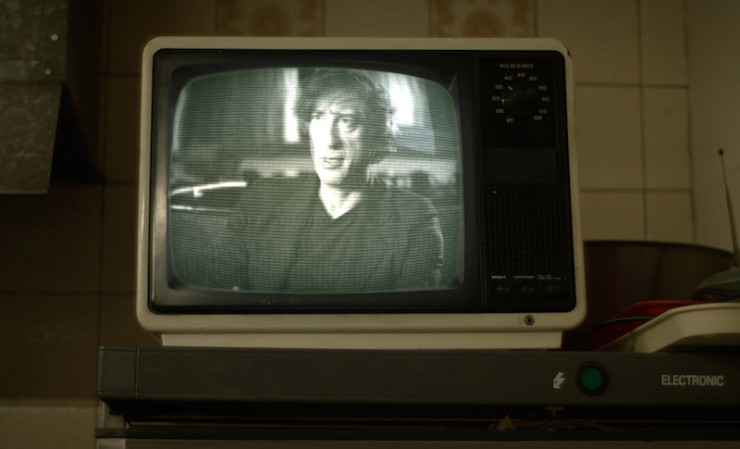The first ten minutes of “Foreign Parts,” the first of four Neil Gaiman short stories to be adapted for TV in Neil Gaiman’s Likely Stories, are uncomfortable viewing. That’s partially due to the setup which follows Simon Powers (George Mackay), a man who is professionally cautious of very nearly everything besides his fondness for solitude and masturbation. Simon hasn’t had sex with anyone other than himself for three years, has a stable job, a stable life and absolutely no prospect of anything changing. Until he’s woken up by pain in his genitals and goes to the Doctor. Simon, it turns out has picked up an infection.
But from where? Or who?
For ten minutes you find yourself wondering if you really are about to watch a half hour drama about a not especially pleasant man’s urethra infection. For ten minutes, if you’re a Brit, you look at the dingy décor and the grumpily polite London that Simon moves through and wonder if that really is all there is to the country. For ten minutes, you hope desperately that the subplot involving the collapse of Doctor Benham’s marriage is actually going to work. For ten minutes you wonder if Gaiman’s Hitchcockian cameos on TV screens and radios will pay off.
Hold on.
It all does.
Iain Forsyth and Jane Pollard direct each episode in the series, and they take you all the way down the rabbit hole before leading you back out. The Benham’s marriage, and the idea of transformation that lies at the heart of their conversation, is central to the episode. Later scenes make it explicit, too, as Gaiman and screenwriter Kevin Lehane use their domestic apocalypse as a counterpoint to the increasingly strange things happening to Simon Powers. This is a story about becoming and, as it goes on, there are hints that the Benhams have become individuals, rather than a couple, and neither has quite realized it.
That theme is carried through Gaiman’s cameos, too, a practice that carries through into the second episode, “Feeders and Eaters.” In both cases he’s a presence within the story, commenting on it but, as he himself advocates, never explaining it.
Again this walks an absolutely razor thin-line between massive self-indulgence and narrative elegance but it comes down on the right side. Gaiman’s presence is almost ambient, a reminder of what tone to expect far more than a warning signs pointing to specifics.

But “Foreign Parts” lives and dies on George MacKay’s performance. His work as Simon is, again, just barely within the realm of caricature and combined with the grim palate it all feels a little “worthy 1980s TV drama” for those first ten minutes. But again, the start point is not the end point here and MacKay shows us the literal, and metaphorical evolution of Simon through what’s essentially two entirely separate performances. The Simon we meet is hunched, grim, buttoned-up, and trapped in dreadful baggy underwear and a bedsit the colour of 1970s despair. The Simon we see as we leave is relaxed, comfortable, and confident. Crucially he’s also more than a little frightening, as Gaiman, Lehane, Forsyth, Pollard, and MacKay all come together to give you an ending that changes perspective depending on how you look on it. From some angles, it’s terrifying. From others, it’s the story of a man becoming more than his past.
That narrative mutability is the show’s biggest strength, and Forsyth and Pollard’s direction does a couple of brilliant things in a very small space. The final night we see is chilling, the direction using image projection to show us two versions of Simon trapped in the same place. Likewise, the narration and repeated motif of his distorted reflection puts us in his head, even as he is perhaps being evicted from it. It’s subtle, profoundly disturbing work that leaves the stage with you wanting more.
Which, thankfully, you get.
“Feeders and Eaters”, the second story, focuses on Joyce. Played by Montserrat Lombard—who was a big part of the BBC’s gloriously weird ‘80s-set metaphysical cop show Ashes to Ashes—Joyce is a waitress in an all-night cafe. She’s also extremely pregnant and mostly unflappable. Addressing the camera, she explains that you get all sorts during the night shift and, on occasion, some interesting stories, too. That leads directly to the arrival of Eddie, played by Tom Hughes. A former crush of Joyce’s, Eddie has clearly seen better days. And, with nothing to do but kill some time, he tells her all about it.
What follows is a story that again, is based in the mould-coloured plaid flats of London but goes to very different places. Eddie becomes friends with Effie Corvier, played by Rita Tushingham. They live in the same building and Effie, while old and frail, is unique in a way that draws Eddie in…until she gets sick and he finds out just how unique she is.
The slightly wider focus pays dividends for “Feeders and Eaters,” a story that (SPOILERS…) cat lovers should perhaps avoid the penultimate five minutes of. It echoes with the idea of nurturing the young vs. feeding off them, and what happens when you find yourself on a very different level of the food chain. Hughes is excellent as the fundamentally decent, slightly dreamy Eddie, whose good nature does nothing but get him in trouble.

It’s Tushingham who haunts you, though. The true nature of her character is just sketched in enough to be disturbing, but she sidesteps every single cliché. Effie is friendly, open, and slightly desperate. Only in the very last shot you (perhaps) see her does her true nature become clear, and even then it’s left just ambiguous enough. A face at a window, the sense of belonging not to where you want to be, but where you choose to be. Someone in the middle of an impossible situation finding typically British solace in a chat, a cup of tea, and some toast. There are a million stories in the naked city and Joyce, and we, are lucky enough to brush up against one of the odd ones. And luckier still that it leaves us alone.
Likely Stories does one thing wrong, and that’s embrace its locale a little too tightly. Jarvis Cocker’s soundtrack maps to the problem perfectly. Like the direction, it’s often subtle, unsettling, and brilliant. Like the direction, it’s also occasionally way too on the nose tonally.
But that single issue aside, this is a massively impressive opening instalment. Profoundly unsettling, clever, and gentle, Likely Stories is a show with a unique voice that any genre fiction, or fan of great TV drama, should make a beeline for. Push through those first ten minutes. It’s worth it.
Note: Neil Gaiman’s Likely Stories airs on Sky Arts in the UK; “Foreign Parts” and “Feeders and Eaters” premiered on May 26th, while “Closing Time” and “Looking for the Girl” air on June 2nd.
Alasdair Stuart is a freelancer writer, RPG writer and podcaster. He owns Escape Artists, who publish the short fiction podcasts Escape Pod, Pseudopod, Podcastle, Cast of Wonders, and the magazine Mothership Zeta. He blogs enthusiastically about pop culture, cooking and exercise at Alasdairstuart.com, and tweets @AlasdairStuart.










